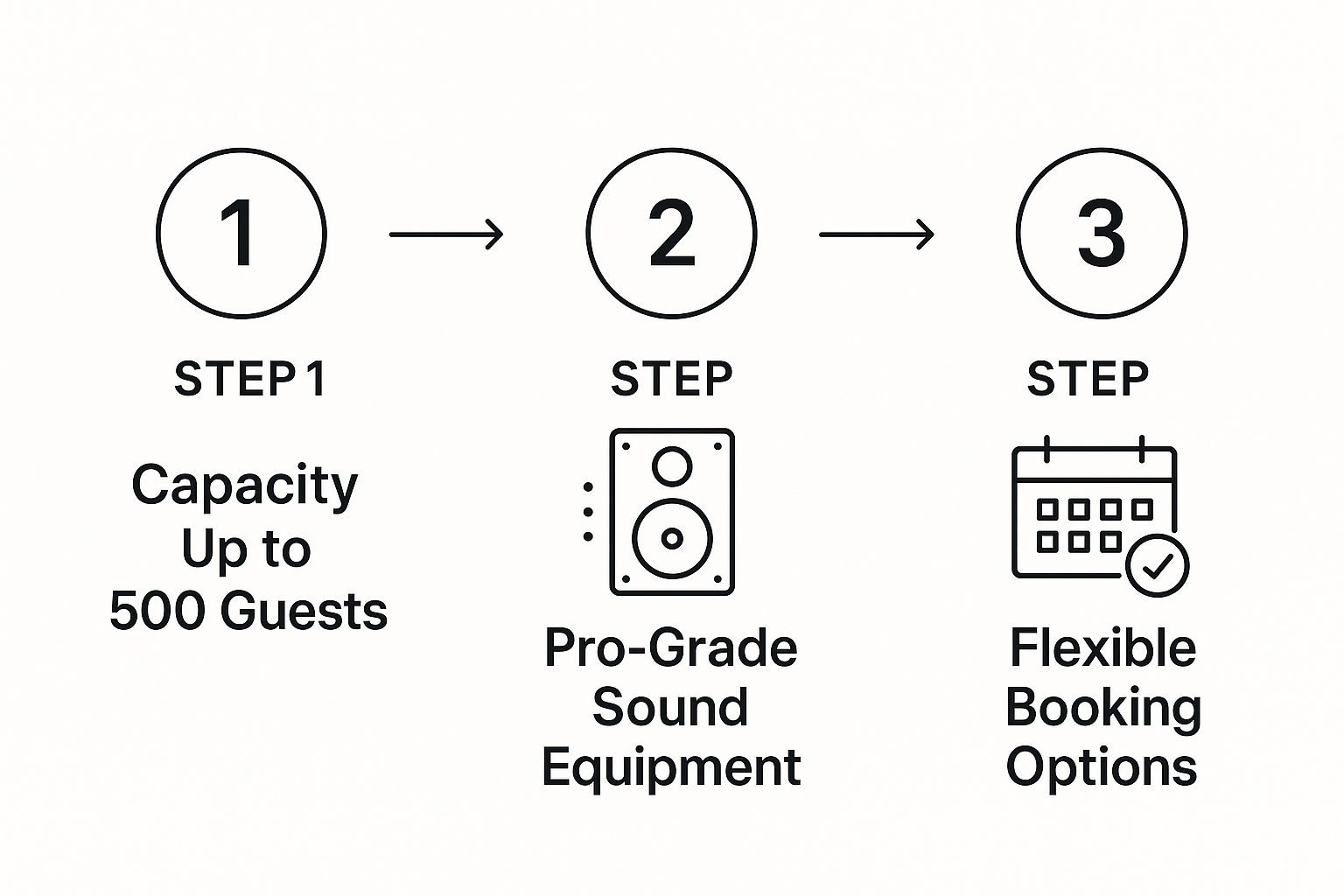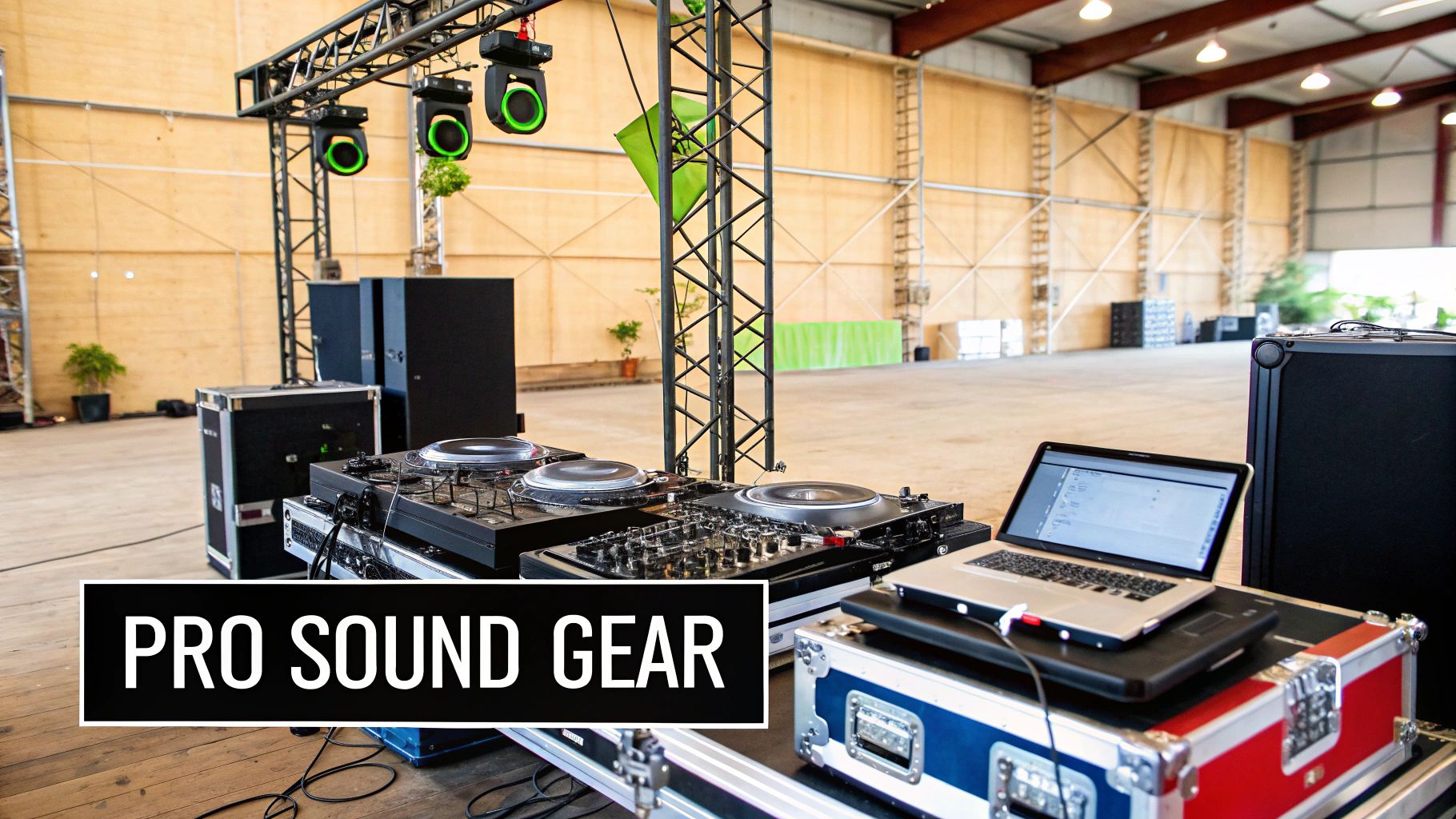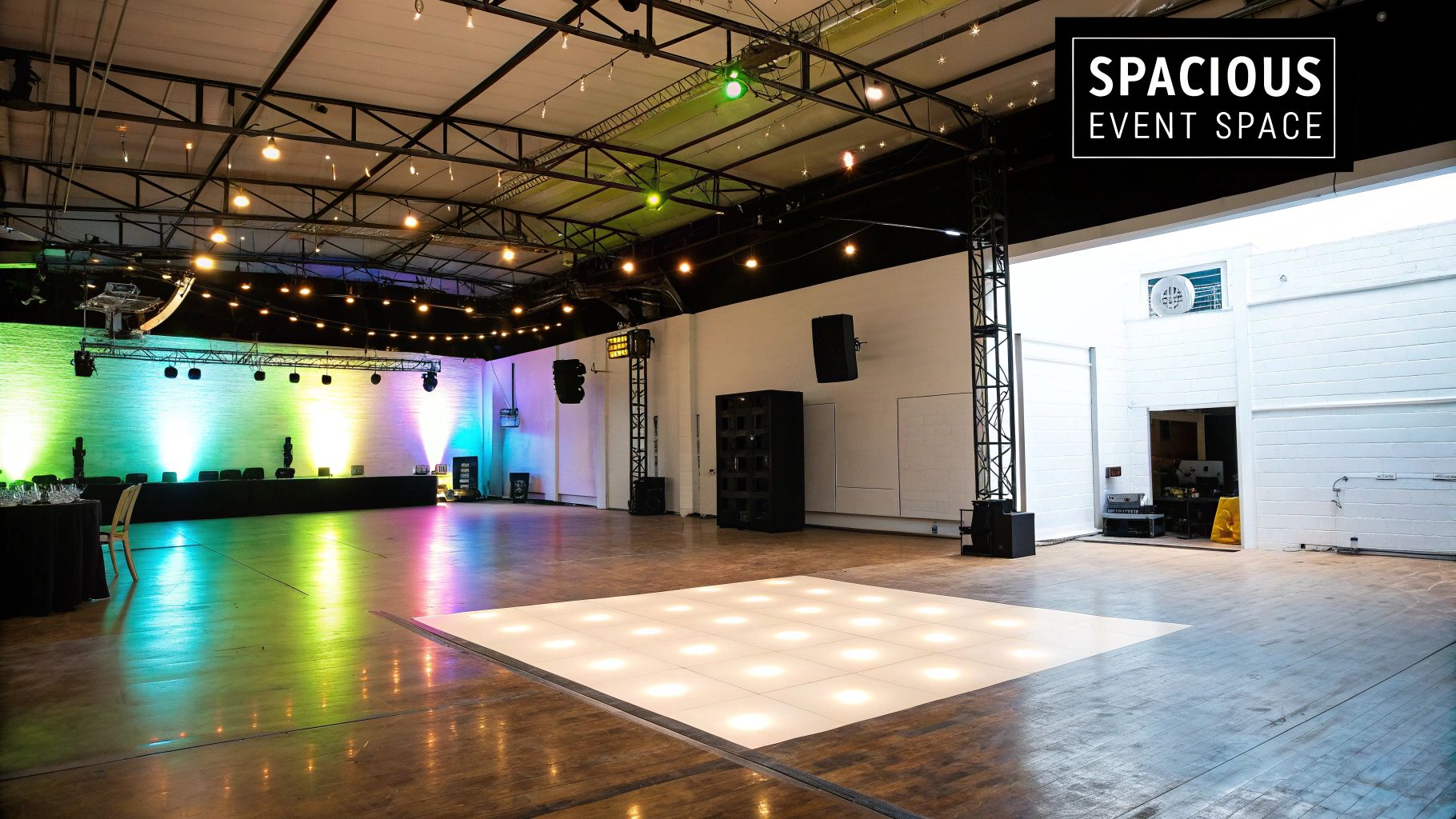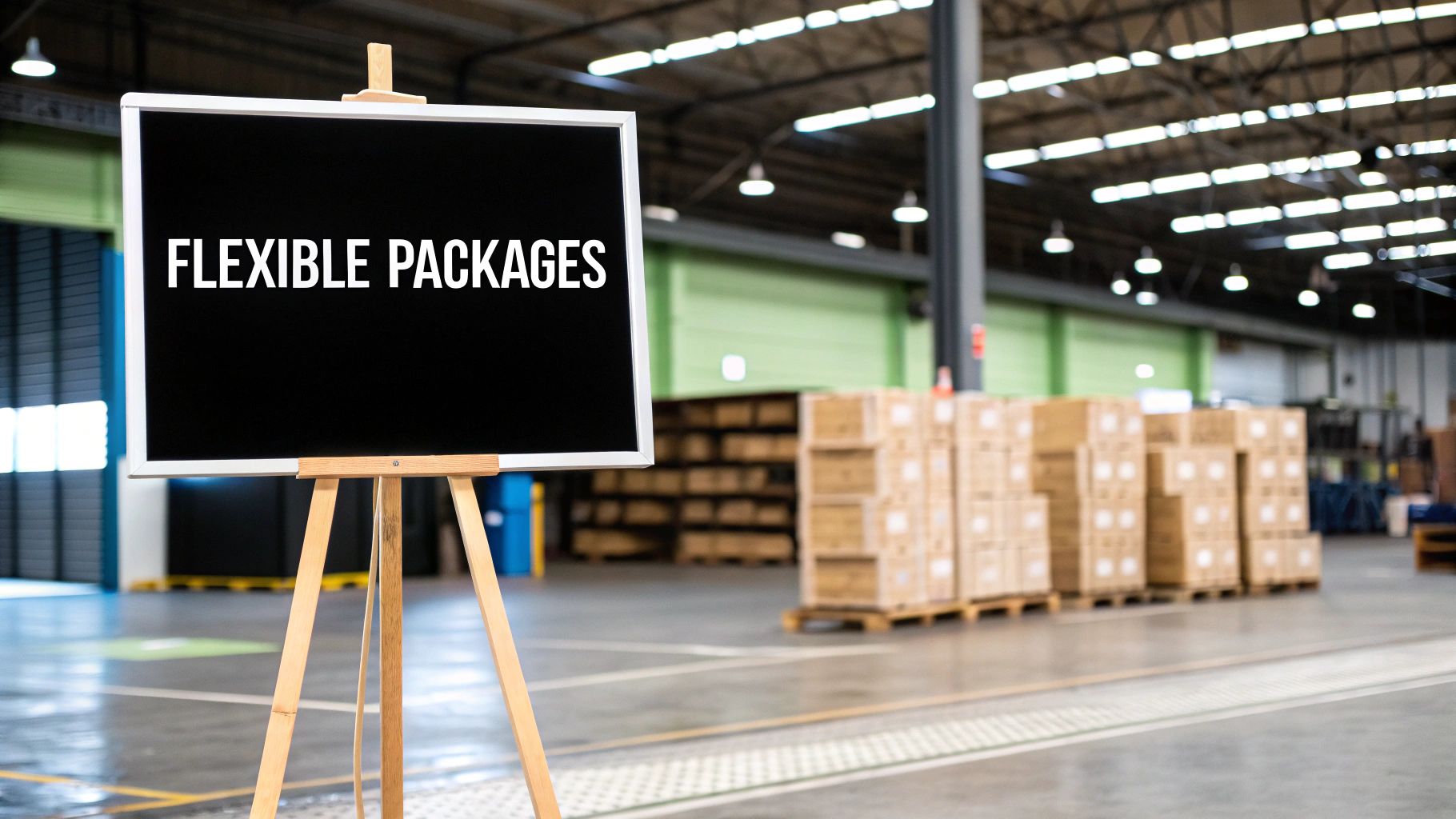DJ Warehouse Hire Melbourne Your Ultimate Guide
- contact733797
- Sep 5, 2025
- 11 min read
Finding the right blank canvas for a DJ warehouse hire in Melbourne isn't just about finding four walls and a roof. It's about securing a space with the right industrial soul to create a truly unforgettable night. The best spots are often tucked away in suburbs like Brunswick, Collingwood, and the inner-west, giving you the freedom to bring your own unique vision to life.
Finding Melbourne’s Best Blank Canvas Venues
Melbourne is packed with old industrial buildings, and that’s a huge plus for anyone organising an event. These spaces offer a raw, atmospheric vibe you just can't get from a standard function room. But let's be clear: not every warehouse is cut out for the job.
The real trick is to look past the usual venue-finding websites. You need to dig into creative communities and industrial zones where landlords are more likely to be on board with a loud, high-energy event.
Before you start picturing the decorations, you need to think about the practical stuff. A genuine 'DJ-ready' warehouse has a few non-negotiable features. Getting these right from the start will save you a world of pain later on.
What Makes a Warehouse DJ-Ready?
The perfect space is built to handle a full-scale production. It’s way more than just a big empty room. As you start your search, make sure these three things are at the top of your checklist.
Serious Power Infrastructure: Forget about a standard power point. You need a venue with multiple circuits, and ideally, three-phase power. This is what you'll need to run a professional sound system and a proper lighting rig without constantly worrying about tripping a breaker.
Easy Vehicle Access: How are you getting all the gear in? Look for large roller doors and clear access for trucks. Trying to load in massive speakers and staging through a cramped laneway entrance is a logistical nightmare you don't want.
Workable Acoustics: Think about how sound will travel. A bit of an echo is part of the warehouse charm, but a space that’s an echo chamber will completely ruin the music. Also, check out the neighbours. A warehouse surrounded by other industrial units is always a safer bet for noise complaints than one next to a block of apartments.
Finding a venue that nails these fundamentals is your first big win. It gives you a solid foundation to build your event on, letting you focus on the creative side of things instead of fighting with the space itself.
If you're new to sourcing unique spots, our comprehensive guide to studio hire in Melbourne has a bunch more tips that can help you find and book the perfect creative space for any kind of project.
Your Essential On-Site Warehouse Inspection
So, you've narrowed down your list and have a few promising warehouses in your sights. Now for the most important part: the site visit. Photos online can be incredibly forgiving, so getting your boots on the ground is the only way to truly vet a space. This is where you move beyond the vibe and get into the nitty-gritty technical details that can make or break your night.
Power, Sound, and Logistics
First things first, let's talk power. Your standard wall socket just isn't going to cut it for a full-scale DJ rig, subs, and lighting. You need to hunt down the main power board. Ask the venue manager to show you exactly what you’re working with – you're looking for multiple, independent circuits, ideally with beefy 15-amp or 20-amp outlets. Don't be shy; find out precisely where these access points are in relation to where you plan to set up the decks.
Next up, acoustics. Stand in the middle of the room and give a loud, sharp clap. A bit of an echo is normal in a big, empty space, but listen for how long it rings out. If the sound bounces around forever, you're heading for a muddy, chaotic audio experience once the music is pumping. Raw brick walls and timber beams are your friends here, as they absorb sound. Polished concrete floors and large metal surfaces? They're your enemy, reflecting sound all over the place.

Logistics are the unglamorous part of the job, but ignore them at your peril. Get out the tape measure and check the roller door's height and width. Will the hire truck actually fit? Walk the exact path your crew will take from the loading dock to the stage. You're scouting for hazards – a sneaky flight of stairs, a ridiculously tight corner, or an uneven floor that'll make moving a road case feel like an Olympic sport. A difficult bump-in sets a bad tone for the whole event.
Guest Comfort and Safety
With the technical side sorted, it's time to think about your guests. A few key things can massively impact their experience:
Toilets: Seriously, are there enough for the number of people you're expecting? Pop your head in and check they're clean and, most importantly, working.
Airflow: A dance floor packed with people gets hot, fast. Look for big roller doors you can open, windows that provide a cross-breeze, or any industrial fans. A stuffy room kills the energy.
Emergency Exits: This is a non-negotiable safety check. Find all the emergency exits. Make sure they are clearly signed, completely unobstructed, and unlocked.
To keep everything straight during your tour, it's helpful to have a checklist on hand. This ensures you don't forget to ask a crucial question while you're distracted by the potential of the space.
Warehouse Venue Technical Checklist
Feature | What to Check | Importance (High/Med/Low) |
|---|---|---|
Power Supply | Locate the main board. Count the number of independent circuits. Confirm 15/20-amp outlets are available. | High |
Acoustics | Perform a clap test. Identify sound-reflective surfaces (concrete, metal) vs. absorbent ones (brick, timber). | High |
Loading Access | Measure roller door height/width. Walk the path from the loading bay to the main floor. Note any stairs or tight corners. | High |
Restrooms | Count the number of toilets. Check for cleanliness and functionality. | Med |
Ventilation | Look for industrial fans, large windows, or doors that can be opened for airflow. | Med |
Lighting | Assess existing house lights. Check if they can be dimmed or controlled. Identify rigging points for your own lighting. | Med |
Emergency Exits | Confirm all exits are clearly marked, unlocked, and have a clear path. | High |
Mobile Reception | Check for phone signal in different areas of the venue. This is vital for staff and ticketing. | Low |
Having this list ready means you can quickly and efficiently assess each venue, making a direct, fact-based comparison later on. It's the best way to ensure you're choosing a space that works on a practical level, not just an aesthetic one.
Dealing with Council Permits and Noise Rules

Let's be honest, the biggest headache for any DJ warehouse hire in Melbourne isn't usually finding a cool spot. It's getting tangled in the web of council permits and noise regulations. This is where the real work happens, and getting it right is the difference between an unforgettable night and getting shut down by 11 PM.
Every single council, whether it’s the City of Yarra or Darebin, has its own rulebook. You'll almost certainly need to apply for a temporary event permit, or for larger events, a Place of Public Entertainment (POPE) permit. These aren't just rubber-stamp forms; they demand a solid plan for safety, waste management, and the big one: noise.
Getting Your Permit Application Across the Line
The trick is to be proactive. Don't just fill out the form and hope for the best. A thoroughly prepared application that anticipates the council's concerns shows them you’re a professional, not a liability. This simple shift in approach can save you weeks of back-and-forth emails.
Make sure your application nails these three things:
A Solid Sound Management Plan: Don’t just say "we'll have music." Detail your sound system, speaker placement (e.g., facing away from residential properties), and the exact hours the music will be on. I always recommend including a note that you’ll perform sound checks from the nearest residential boundary to show you’re serious about managing spill.
A Clear Rundown of Timings: Be precise. Give them the start and finish times for the event itself, but also for your crew's setup and pack-down. The council wants to see a tight, organised schedule.
Your Security and Safety Strategy: Lay out your plans for security staff, marked emergency exits, and on-site first aid. This isn't just box-ticking; it's about demonstrating you can run a safe event.
Here’s a piece of advice from experience: don't just guess where the neighbours are. Actually map out the nearest houses. Even a warehouse deep in an industrial estate can be surprisingly close to a residential street. Acknowledging this in your sound plan shows the council you've done your homework.
Nailing the permits is non-negotiable. It's the foundation of a successful event. A smart, well-documented approach doesn't just get you a stamp of approval; it protects your reputation and makes sure the music plays all night long.
Bring Your Space to Life with Pro Sound and Lighting
A warehouse gives you the raw atmosphere, but it’s the gear that truly creates the experience. You’re turning a big, empty shell into a full-blown production, and that means choosing sound and lighting that can actually fill the space. For this, a DIY equipment hire approach gives you total creative freedom and is often much kinder to your budget.

Unlike a regular venue, an industrial space just swallows sound and light. Those speakers you use for a house party? They won’t even make a dent. You need a system with some serious power to push crisp, punchy audio into every corner. I’m talking multiple top speakers and at least two hefty subwoofers to really feel the bass.
Lighting needs to be just as bold to make any sort of impact. Forget a few simple mood lights; you have to think bigger. Strategic wash lights can drench entire brick walls in colour, while moving heads and lasers cut through the haze, bringing a dynamic energy that completely transforms the room.
The Smart Way: Professional DIY Hire
Going with a specialist supplier for your gear is the only way to go. They’ll give you professional-grade equipment that’s actually designed to be user-friendly. For over two decades, companies like DJ Warehouse Hire have been a massive part of the Melbourne event scene, building their whole business around empowering people with DIY solutions—they even put QR codes on the gear that link straight to setup guides.
This "plug-and-play" approach puts you in control. You get to build the exact vibe you’re imagining without needing a team of technicians.
The whole point is to walk in with your vision and have the tools to make it happen, no stress. You pick the gear, and the hire company gives you the support to ensure the sound system and lighting rig all work together perfectly.
This method is a game-changer, especially when you’re dealing with a unique space. It’s the same principle we talk about in our guide to music studio hire in Melbourne—the right equipment can elevate any project. When you take charge of the technical side yourself, you can be sure the final result is exactly what you had in mind from the start.
Locking It Down: Your Venue Agreement and Negotiation
So, you've found the one. That perfect industrial shell is calling your name. Now for the serious part: locking it in with an agreement that leaves no room for nasty surprises on the night. This is where you switch from your creative hat to your business one.

How you present yourself to the venue manager from the get-go matters. Walk in prepared. Show them you're a professional by outlining your sound management plan, your security team details, and how you’ll treat their space with respect. A bit of trust built upfront goes a long way when it comes to negotiation.
That hire agreement might look like a wall of legal jargon, but there are a few key clauses that you absolutely cannot afford to skim.
The Make-or-Break Clauses in Your Contract
Before your pen goes anywhere near that dotted line, find these sections and read them twice. These are the details that can cause the biggest headaches if you’re not paying attention.
Bump-In & Bump-Out Times: These times are almost always set in stone. Get crystal clear on the exact window you have for access. Your entire setup and pack-down schedule has to fit within these hours, because going even slightly over can mean losing a chunk of your bond.
Bond & Insurance Details: Every single venue will ask for a security bond and proof of public liability insurance. You need to know precisely what "full bond refund" means in their eyes. Check that your insurance policy meets their minimum—it's usually a $20 million coverage requirement.
Cleaning & Waste Removal: The contract has to spell out how clean they expect the place to be when you hand back the keys. Is "broom swept" okay, or are they expecting a professional clean? And who's hauling away all the rubbish? Don't assume.
Think of your contract as your safety net. Give it the time and attention it deserves. A solid, clear agreement is the bedrock of a successful event, freeing you up to focus on what really matters: the music and the vibe.
The appetite for unique, flexible event spaces has exploded. With Melbourne's population now tipping over 5 million, the whole party and equipment hire industry has been on a steady rise. This is exactly why a good DJ warehouse hire in Melbourne has become such a sought-after option.
If you want to dig deeper, you can read about Melbourne’s thriving event hire scene to get a feel for the market. By getting your agreement right, you’re not just booking a venue; you’re claiming your spot in it.
Got Questions About Melbourne Warehouse Hire? We've Got Answers
Organising a big event is bound to stir up a lot of questions. And when you're looking at a blank canvas space for a DJ warehouse hire in Melbourne, those questions can feel even more urgent. We've tackled the most common queries to give you clear, straight-up answers so you can plan like a pro.
What’s the Real Cost to Hire a Warehouse for a Party?
The price tag can swing wildly based on location, size, and what's already included. A completely raw industrial shell out in the suburbs might set you back $1,500-$3,000 for a night.
But if you're eyeing a more polished, event-ready space in a spot like Collingwood, you're realistically looking at $4,000-$10,000+.
Don't forget, that's just for the keys. You'll need to budget separately for all the essentials: security, council permits, insurance, and every piece of sound and lighting gear.
Is Public Liability Insurance Actually a Must-Have?
One hundred percent. This is non-negotiable. Any legitimate warehouse venue will have it in their contract that you need your own public liability insurance, usually for around $20 million in coverage.
It might sound like a lot, but this protects you and the venue owner from massive financial fallout if someone gets hurt or something gets broken. Thankfully, getting a policy for a single event is pretty straightforward and just part of the cost of running a safe, responsible gig.
How Much Power Does a DJ Setup Really Chew Through?
Heaps. A professional DJ setup with a decent lighting rig is a power-hungry beast. A single standard 10-amp wall socket won't even come close—you'll be tripping the circuit breaker all night, killing the music and the entire vibe.
You absolutely need a venue with multiple, independent circuits. Look for several 15-amp or, even better, 20-amp outlets. Get this confirmed in writing from both the venue manager and your equipment hire company before you sign anything.
Can I Get Some Help Setting Up All the Gear?
Of course. While some people love the full DIY challenge, the best hire companies are more like partners. They can help you pick the right gear for the space and your vision, so you don't waste money or come up short on the night.
Many will provide detailed setup guides, and some can even connect you with experienced technicians for hands-on help. It’s the best of both worlds: you get the creative freedom of a DIY setup with a professional safety net. If you're just starting out, getting some proper training can make all the difference. You can check out some of the top DJ training schools in Melbourne to level up your technical skills.
At That Creative Hub, we’re all about empowering you to create—whether you’re a seasoned pro or just starting out. Our spaces are designed to be plug-and-play, but we’re always here to support behind the scenes.
Using our Cyclorama Studio? Bring your own camera and crew or ask us to connect you with a trusted photographer or videographer from our network. If you’re new to lighting or unsure how to get started, we can guide you through what you need or step in with setup support. The goal is to make it easy for you to walk in and create confidently.
For podcast users, we offer a fully-equipped, ever-evolving set with a dedicated production manager on-site. Whether you’re filming an interview, a solo series, or a branded piece of content, we can help set the vibe and adjust the layout to suit your vision.
Need help? Just ask. We act as a concierge service for creators, linking you with the right people and tools to bring your vision to life. From photographers to editors, lighting setups to sound checks—we’ve got you.
Book a tour of our Melbourne studios today and find the perfect canvas for your next project.
Comments